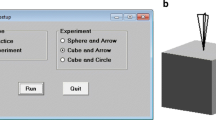Abstract
Visuospatial abilities have been demonstrated to predict the performance of medical students in simulated endoscopy. However, little has been reported whether differences in visuospatial abilities influence the performance of senior endoscopists or whether their vast endoscopy experience reduces the importance of these abilities. Eleven senior endoscopists were included in our study. Before the simulated endoscopies in GI Mentor II (gastroscopy: case 3, module 1 and colonoscopy: case 3, module 1), the endoscopists performed three visuospatial tests: (1) pictorial surface orientation (PicSOr), (2) card rotation, and (3) cube comparison tests that monitor the ability of the tested person to re-create a three-dimensional image from a two-dimensional presentation as well as mentally manipulate that re-created image. The results of the visuospatial tests were correlated to the performance parameters of the virtual-reality endoscopy simulator. The percent of time spent with clear view in the simulated colonoscopy correlated well with the performance in the visuospatial PicSOr (r= -0.75, P = 0.01), card rotation (r = 0.75, P = 0.01), and cube comparison (r = 0.79, P = 0.004) tests. The endoscopists who performed better in the visuospatial tests also were better at maintaining visualization of the colon lumen. Those who performed better in the PicSOr test formed fewer loops during colonoscopy (r = 0.60, P = 0.05). In the technically less demanding simulated gastroscopy, there were no such correlations. The visuospatial tests performed better in endoscopists not playing computer games. Good visuospatial ability correlates significantly with the performance of experienced endoscopists in a technically demanding simulated colonoscopy, but not in the less demanding simulated gastroscopy.
Similar content being viewed by others
References
Seymour NE, Gallagher AG, Roman SA, et al. Virtual reality training improves operating room performance: Results of a randomized, double-blinded study. Ann Surg 2002;236:458–463.
Grantcharov TP, Kristiansen VB, Bendix J, Bardram L, Rosenberg J, Funch-Jensen P. Randomized clinical trial of virtual reality simulation for laparoscopic skills training. Br J Surg 2004;91:146–150.
Ferlitsch A, Glauninger P, Gupper A, et al. Evaluation of a virtual endoscopy simulator for training in gastrointestinal endoscopy. Endoscopy 2002;34:698–702.
Tuggy ML. Virtual reality flexible sigmoidoscopy simulator training: Impact on resident performance. J Am Board Fam Pract 1998;11:426–433.
Ritter EM, McClusky DA 3rd, Lederman AB, Gallagher AG, Smith CD. Objective psychomotor skills assessment of experienced and novice flexible endoscopists with a virtual reality simulator. J GASTROINTEST SURG 2003;7:871–877.
Sedlack RE, Kolars JC, Alexander JA. Computer simulation training enhances patient comfort during endoscopy. Clin Gastroenterol Hepatol 2004;2:348–352.
Kohn LT, Corrigan JM. To Err is Human: Building a Safer Health System. Washington, DC: National Academy Press, 1999.
Dawson SL. A critical approach to medical simulation. Bull Am Coll Surg 2002;87:12–18.
Cowie R. Measurement and modelling of perceived slant in surfaces represented by freely viewed line drawings. Perception 1998;27:505–540.
Gallagher AG, Cowie R, Crothers I, Jordan-Black JA, Satava RM. PicSOr: An objective test of perceptual skill that predicts laparoscopic technical skill in three initial studies of laparoscopic performance. Surg Endosc 2003;17:1468–1471.
Ekstrom RB, French JW, Harmann HH. Manual for Kit of Factor-Referenced Cognitive Tests. Princeton: Educational Testing Service, 1976.
Gallagher A, Crothers I, Satava R. Objective measures of visio-spatial ability for minimally invasive surgery. In: 12th European Association for Endoscopic Surgery Congress, 2004. Barcelona: 2004.
Ritter EM, McClusky DA 3rd, Lederman AB, Gallagher AG, Smith CD. Perceptual, Visuospatial, and Psychomotor Ability Correlates With Duration of Learning Curve on a Virtual Reality Flexible Endoscopy Simulator. Presented at Southeastern Surgical Congress; Feb 2, 2004; Atlanta, GA.
Enochsson L, Isaksson B, Tour R, et al. Visuospatial skills and computer game experience influence the performance of virtual endoscopy. J GASTROINTEST SURG 2004;8:876–882.
Eversbusch A, Grantcharov TP. Learning curves and impact of psychomotor training on performance in simulated colonoscopy: A randomized trial using a virtual reality endoscopy trainer. Surg Endosc 2004;18:1514–1518.
Kneebone RL, Nestel D, Moorthy K, Taylor P, Bann S, Munz Y, Darzi A. Learning the skills of flexible sigmoidoscopy -the wider perspective. Med Educ 2003;37(Suppl 1):50–58.
Gerson LB, Van Dam J. A prospective randomized trial comparing a virtual reality simulator to bedside teaching for training in sigmoidoscopy. Endoscopy 2003;35:569–575.
Clark JA, Volchok JA, Hazey JW, Sadighi PJ, Fanelli RD. Initial experience using an endoscopic simulator to train surgical residents in flexible endoscopy in a community medical center residency program. Curr Surg 2005;62:59–63.
Sedlack RE, Kolars JC. Computer simulator training enhances the competency of gastroenterology fellows at colonoscopy: Results of a pilot study. Am J Gastroenterol 2004;99:33–37.
Author information
Authors and Affiliations
Corresponding author
Rights and permissions
About this article
Cite this article
Westman, B., Ritter, E.M., Kjellin, A. et al. Visuospatial abilities correlate with performance of senior endoscopy specialist in simulated colonoscopy. Journal of Gastrointestinal Surgery 10, 593–599 (2006). https://doi.org/10.1016/j.gassur.2005.08.014
Issue Date:
DOI: https://doi.org/10.1016/j.gassur.2005.08.014




